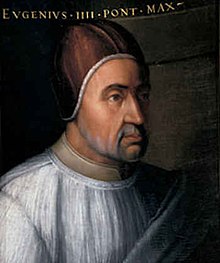
Back Pous Eugenius IV Afrikaans إيجين الرابع Arabic ايجين الرابع ARZ Eugenio IV AST Яўген IV Byelorussian Эўгеніюш IV (папа рымскі) BE-X-OLD Евгений IV Bulgarian Ujan IV Breton Eugeni IV Catalan Gáu-huòng Eugenius 4-sié CDO
Eugene IV | |
|---|---|
| Bishop of Rome | |
 Portrait by Cristofano dell'Altissimo, after an original by Jean Fouquet | |
| Church | Catholic Church |
| Papacy began | 11 March 1431 |
| Papacy ended | 23 February 1447 |
| Predecessor | Martin V |
| Successor | Nicholas V |
| Previous post(s) |
|
| Orders | |
| Consecration | 1408 by Gregory XII |
| Created cardinal | 9 May 1408 by Gregory XII |
| Personal details | |
| Born | Gabriele Condulmer 1383 |
| Died | 23 February 1447 (aged 63–64) Rome, Papal States |
| Coat of arms |  |
| Other popes named Eugene | |
Pope Eugene IV (Latin: Eugenius IV; Italian: Eugenio IV; 1383 – 23 February 1447), born Gabriele Condulmer, was head of the Catholic Church and ruler of the Papal States from 11 March 1431 to his death, in February 1447. Condulmer was a Venetian, and a nephew of Pope Gregory XII. In 1431, he was elected pope.
His tenure was marked by conflict first with the Colonna, relatives of his predecessor Pope Martin V, and later with the Conciliar movement. In 1434, due to a complaint by Fernando Calvetos, bishop of the Canary Islands, Eugene IV issued the bull "Creator Omnium", rescinding any recognition of Portugal's right to conquer those islands, rescinding any right to Christianize the natives of the island. He excommunicated anyone who enslaved newly converted Christians, the penalty to stand until the captives were restored to their liberty and possessions. In 1443, Eugene decided to take a neutral position on territorial disputes between Castile and Portugal and regarding rights claimed along the coast of Africa. In 1444, he issued "Dudum ad nostram audientiam", which was the legal basis for the creation of Jewish ghettos in Europe.